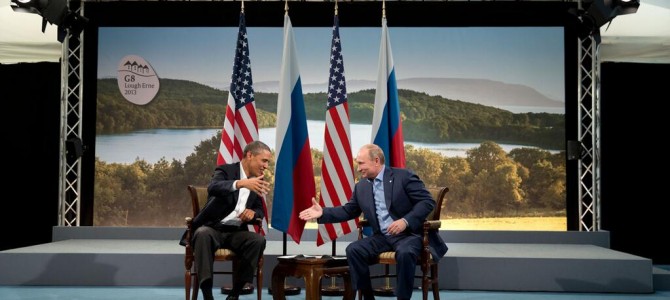
Was Russia meddling in the 2016 election to ensure a Donald Trump victory? That’s the conclusion of the CIA’s “secret assessment,” which claims individuals with connections to the Russian government provided WikiLeaks hacked emails from the Democratic National Committee and Hillary Clinton’s campaign chairman.
The response among Democrats has been predictable. On Friday, the Obama White House ordered a “full review,” while Clinton’s campaign is demanding declassification of the intelligence. In a statement, Clinton campaign chairman John Podesta said: “We now know that the C.I.A. has determined Russia’s interference in our elections was for the purpose of electing Donald Trump. This should distress every American. Never before in the history of our republic have we seen such an effort to undermine the bedrock of our democracy.”
Podesta is right that Russia’s meddling in our elections should distress every American. But let’s not pretend that such meddling is something new and unprecedented. During the Cold War, the Soviet Union maintained what it called “active measures” to undermine democracies in the West, including the United States. Sometimes they even had willing accomplices here in America.
In March of last year, my colleague Sean Davis wrote about one such effort back in 1984, when Sen. Ted Kennedy begged the Soviets to intervene in the 1984 presidential election in order to unseat President Ronald Reagan. According to Soviet documents unearthed after the collapse of the Soviet Union in 1991, Kennedy wanted to arrange a visit to Moscow so he could advise the Soviets about how to deal with Reagan on matters of nuclear disarmament.
He also wanted to stage some fake news. According to Kennedy’s secret Soviet communiques, he would arrange for televisions interviews with general secretary of the Central Committee of the Communist Party of the Soviet Union, Yuri Andropov. Through an intermediary, Kennedy proposed the following:
A direct appeal… to the American people will, without a doubt, attract a great deal of attention and interest in the country… If the proposal is recognized as worthy, then Kennedy and his friends will bring about suitable steps to have representatives of the largest television companies in the USA contact Y.V. Andropov for an invitation to Moscow for the interviews… The senator underlined the importance that this initiative should be seen as coming from the American side.
Russian Meddling Is Nothing New
The point is, these new revelations about Russia’s meddling in U.S. elections are nothing new. In fact, Russia’s “active measures” never really went away, even after the fall of the Soviet Union. The difference is, there was a lot at stake for Russia in the 2016 election. A Trump administration would indeed leave Vladimir Putin with more leeway to pursue a revanchist agenda in Ukraine and Eastern Europe. Trump has had nice things to say about Putin in the past, and his foreign policy approach aligns more with Obama’s than Clinton’s: he wants to roll back the post-Cold War international order. Trump imagines a world where America is just another country, not the guarantor of international peace and stability it has been for decades.
A Clinton administration, on the other hand, would likely be less quiescent about Putin’s irredentist aims. It’s therefore easy to see why Moscow might prefer a President Trump to a President Clinton.
But even still, this misses the bigger picture. In 2012, Obama and the Democrats openly mocked Mitt Romney for suggesting that Russia was the number one foreign policy challenge facing America. Who can forget Obama’s debate quip that the 1980s called and “wants their foreign policy back”? Everyone on the Left had a good laugh.
How could it be, then, that just four years after Russia was the butt of Democrats’ jokes about Romney, it’s now a major threat to American democracy? The terrible truth is something no Democrat will admit: the Russians were always a threat, and Obama didn’t take them seriously. Our weakness abroad—in Syria, in Ukraine, in the South China Sea—emboldened Putin and endangered American interests and standing, and undermined our ability to maintain order and dissuade strongmen like Putin from revising the international order.
Russia Has Bigger Aims Than Electing Trump
As for Russia’s motive in all this, anyone who has been paying attention for the past year-and-a-half can tell you that it goes far beyond a single election or particular candidate. Here’s what I wrote in August:
As tempting as it is to see Russia as a partisan player on Trump’s side, the Kremlin’s goal isn’t to see a particular candidate win. The goal is much more insidious: to undermine American confidence in our political system. That is, the Kremlin’s real target is liberal democracy itself.
Whether Trump realizes it or not, he is nothing to Putin but a useful idiot in this larger effort.
[…] The Russians have chosen their moment well. American confidence in public institutions is languishing at historic lows, while the vast majority of Americans report anger and frustration at the federal government. That lack of trust has helped propel Trump, a political outsider, to the top of the Republican Party ticket. It fueled the insurgent campaign of Bernie Sanders. Now Moscow is exploiting it in the service of a grand strategy, with far greater implications than a single U.S. presidential election.
After all, if Putin can convince Americans that liberal democracy is nothing but a sham, he will accomplish what no leader of the Soviet Union ever could. Decades after we thought it was over, Russia will have finally won the Cold War.
Don’t hold your breath waiting for Obama and the Democrats to admit they were wrong about Russia. To do so now would be to admit that the past eight years of Obama’s foreign policy approach to Moscow have been an unmitigated disaster, and that Russia’s efforts to undermine Americans’ confidence in democracy have been largely successful. And we can’t have that.









